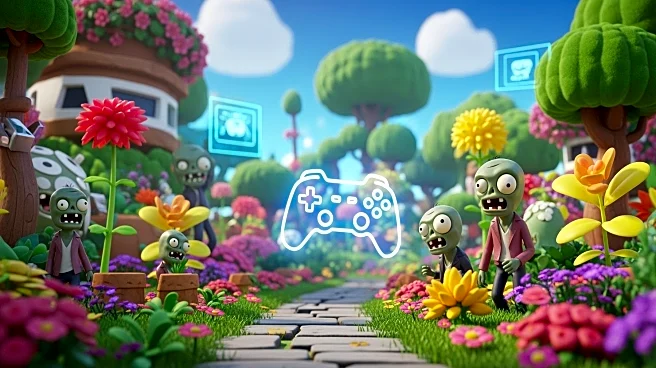What's Happening?
EA has released a remastered version of the popular game Plants vs. Zombies, titled Plants vs. Zombies: Replanted, optimized for the Steam Deck. This new version includes enhanced visuals, additional game modes, and local multiplayer options. The remaster aims
to attract both new players and long-time fans by offering a crisp visual upgrade and a variety of new gameplay features. These include a 'Cloudy Day' mode, which introduces strategic challenges by affecting sunlight availability, and a 'hardcore' mode that adds permadeath to the adventure mode. Additionally, the game revives several minigames that were previously cut from the original release, providing players with more content to explore.
Why It's Important?
The release of Plants vs. Zombies: Replanted is significant as it demonstrates EA's continued investment in revitalizing classic games for modern platforms. By optimizing the game for the Steam Deck, EA taps into the growing market of portable gaming devices, potentially expanding its user base. The inclusion of new features and modes not only enhances the replay value for existing fans but also attracts new players who may have missed the original release. This move could strengthen EA's position in the gaming industry by leveraging nostalgia while also catering to current gaming trends.
What's Next?
As the remastered version gains traction, EA may consider similar updates for other classic titles, potentially leading to a series of remastered releases. The success of Plants vs. Zombies: Replanted could influence EA's future strategies regarding game development and platform optimization. Additionally, player feedback on the new features and modes may guide further updates or expansions, ensuring the game remains engaging and relevant. The gaming community's response will likely shape EA's approach to balancing nostalgia with innovation in its product offerings.
Beyond the Headlines
The remaster of Plants vs. Zombies highlights the ongoing trend of reviving classic games for new platforms, reflecting a broader industry shift towards capitalizing on established franchises. This approach not only appeals to nostalgic gamers but also introduces these classics to a new generation, potentially fostering a renewed interest in older game mechanics and styles. The ethical considerations of remastering games, such as maintaining the original's integrity while enhancing its appeal, remain a topic of discussion among developers and players alike.
















